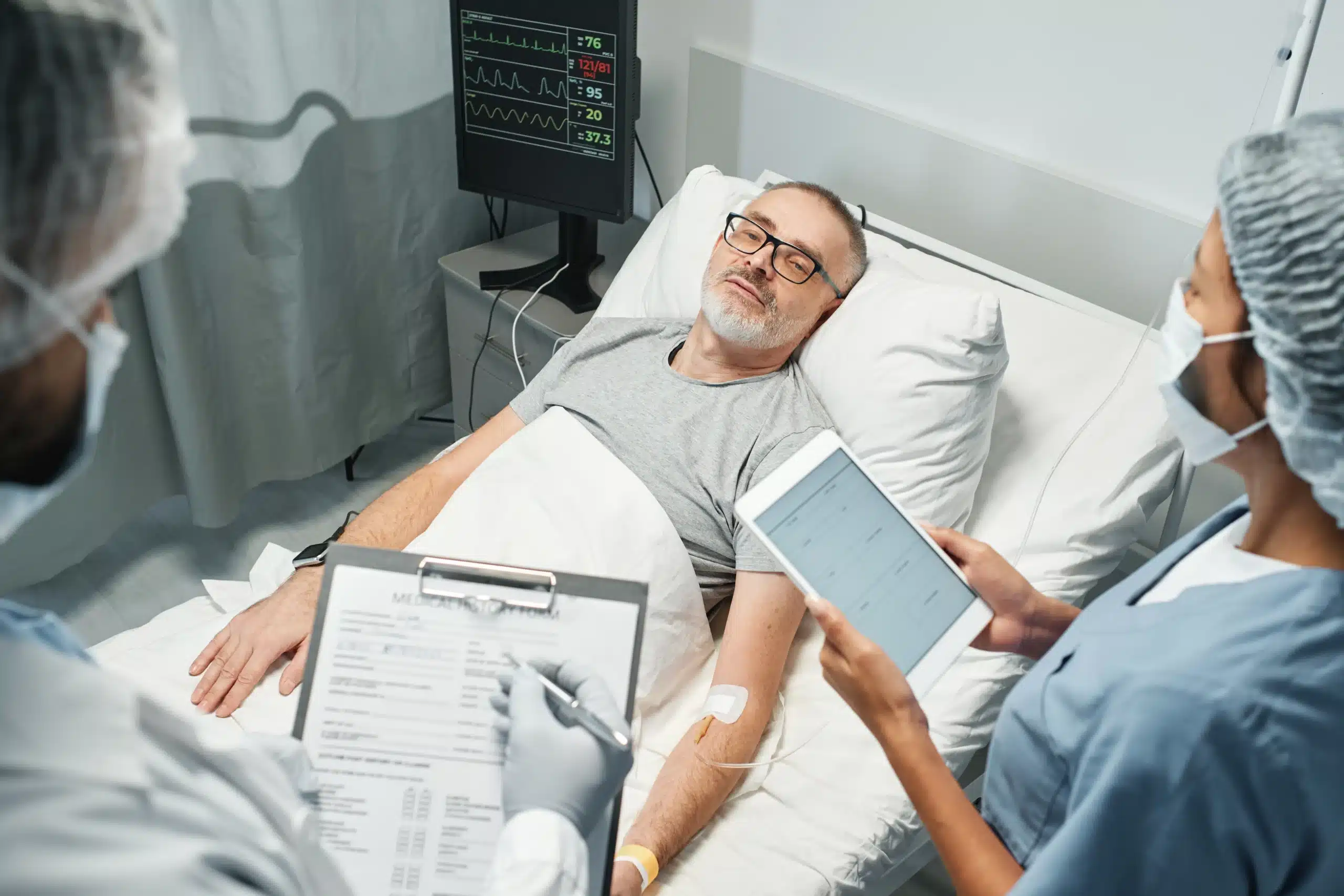 You probably never expected a doctor’s note to play such a massive role in your legal future—but here you are. After an accident, you might think the most important step is contacting your insurance provider or repairing your vehicle. But from our experience as a Richmond injury attorney, we know that what determines the outcome of your claim isn’t your vehicle damage or even your version of the story—it’s your medical records.
You probably never expected a doctor’s note to play such a massive role in your legal future—but here you are. After an accident, you might think the most important step is contacting your insurance provider or repairing your vehicle. But from our experience as a Richmond injury attorney, we know that what determines the outcome of your claim isn’t your vehicle damage or even your version of the story—it’s your medical records.
At The Johnson Injury Firm, we’ve represented countless clients whose cases hinged on whether their medical documentation was timely, complete, and connected to the incident. So, what makes these records so powerful?
Let’s dive into what your medical records represent, how Virginia law treats them, and why they matter more than you might realize.
Your Medical Records Tell a Story—The One That Counts
Insurance companies and courts want more than your word. They need proof. Your medical records act as the central evidence in a personal injury case. They show you were injured, how badly, what treatment was required, and how long your recovery took.
These records answer critical questions like:
- Did you seek treatment right away?
- Were your injuries consistent with the type of accident?
- Did your condition worsen over time or improve?
- Will you need long-term or permanent care?
All of these questions influence the value of your case. As a personal injury lawyer in Richmond, we can confidently say that clear, consistent medical documentation builds credibility and creates a strong foundation for your claim.
Virginia Law Supports Your Right to Access and Use Medical Records
Under § 8.01-413 of the Code of Virginia, patients are entitled to access copies of their medical records. Providers must furnish these records within 30 days of a written request. This legal right ensures you have the tools needed to support your claim.
In personal injury lawsuits, medical records may be admitted as evidence under § 16.1-88.2, which allows written medical reports to be introduced in Virginia’s General District Courts, so long as the provider includes a sworn statement verifying the report’s accuracy. This is especially helpful in avoiding lengthy delays waiting for a healthcare provider’s testimony.
In Circuit Court, however, things change. Your records still matter—but live expert testimony may be required to explain your injuries and connect them to the accident. That’s where we come in. As seasoned Richmond injury attorneys, we help you secure the necessary medical witnesses and ensure your documentation supports their testimony.
Medical Records Can Make or Break Your Claim
Your medical records affect:
- Liability: Establishing that the injury is related to the accident.
- Damages: Showing the injury’s physical, financial, and emotional toll.
- Credibility: Demonstrating that you took the injury seriously enough to seek immediate and ongoing treatment.
Unfortunately, many people unknowingly hurt their own claims by skipping follow-up visits, delaying seeking treatment, or failing to mention all symptoms. These gaps allow insurance companies to say, “You weren’t really hurt.”
The more detailed your medical documentation, the harder it becomes for an insurance adjuster—or a defense attorney—to discredit your case.
How Insurance Companies Use Medical Records Against You
Most people assume their medical records will work in their favor. But insurance companies aren’t looking to validate your pain but to reduce their payout. They scrutinize every detail, looking for inconsistencies, pre-existing conditions, or anything that can be used to argue your injury isn’t serious or wasn’t caused by the accident.
That’s why it’s crucial to work with a PI attorney in Richmond who can anticipate and counter these tactics. At The Johnson Injury Firm, we carefully review your records, identify potential weaknesses, and proactively address them before the insurance company can twist the facts.
Under § 8.01-417, Virginia law allows a claimant to request disclosure of the at-fault party’s insurance policy limits—but only if you provide medical bills and records supporting that your damages exceed $12,500. This law reinforces how central your medical documentation is—not just for proving injury, but for accessing information that can lead to a fair settlement.
Don’t Wait—Delayed Treatment Can Cost You
Timing is everything in personal injury law. A delay in seeking treatment can raise red flags. Insurance companies may argue that if you didn’t get medical care right away, you weren’t seriously injured—or worse, that something else caused your condition.
That’s why we always advise clients to get checked out immediately after an accident, even if they “feel fine.” Some injuries, like concussions or internal bleeding, don’t present symptoms right away. If you wait too long, it becomes more difficult to tie those injuries to the accident.
Your Richmond, VA, personal injury law firm should help you obtain these records, organize them, and ensure they tell the full story. That’s part of our job, and we take it seriously.
Be Honest, Be Thorough
Every doctor’s visit matters. Each appointment adds a layer of credibility to your claim. Tell your doctor everything—from neck stiffness to headaches, sleep problems, and emotional distress. These symptoms may not seem serious, but they can indicate more complex injuries like soft tissue damage or PTSD.
The more thorough you are, the more support we have to fight for compensation. And if there’s an error or missing piece in your records? You have a legal right to request a correction under § 32.1-127.1:03 of the Virginia Code. This ensures your records are complete, accurate, and usable in court.
Only Share What You Must
While providing medical records to support your claim is essential, it’s equally important to avoid over-disclosure. Insurance companies often ask for blanket access to your entire medical history—and you are not legally required to give it to them.
At The Johnson Injury Firm, we carefully review every record request. We only authorize the release of documentation directly related to your injury. Our role is to protect your privacy while building a compelling, fact-based case.
How Our Richmond Injury Attorney Uses Medical Records in Settlement Negotiations
Once your medical treatment is complete or reaches a point of long-term stability, your lawyer can calculate your total damages. That includes:
- Medical expenses
- Lost wages
- Did your condition worsen over time or improve?
- Future care needs
We prepare a settlement demand backed by your medical records. If the insurance company still tries to lowball you, we’re fully prepared to take the case to trial. But often, the strength and clarity of your documentation lead to faster, fairer settlements.
When the Records Don’t Tell the Whole Story
Sometimes, medical records alone aren’t enough. Maybe your provider didn’t document your pain well, or perhaps you were treated in an ER with little follow-up care. In those cases, we work with medical experts who can review your treatment and provide opinions connecting your injuries to the accident.
These expert reports can bridge the gap between minimal records and serious injury. We’ll call these experts to testify if your case goes to court. Your story will be heard—and backed by authoritative, medical evidence.
What You Can Do Right Now
If you’ve been in an accident:
- Seek immediate medical care, even if you think you’re okay.
- Keep all appointments, and follow your provider’s advice.
- Document everything—take notes on symptoms, missed workdays, and emotional changes.
- Request copies of your records regularly to stay informed.
- Speak to a personal injury lawyer in Richmond before signing anything or speaking to insurance adjusters.
Frequently Asked Questions About Medical Records and Personal Injury Claims
Can I include therapy or mental health records in my personal injury case?
Yes, emotional and psychological harm is a valid part of your personal injury claim. If you are undergoing therapy or psychiatric treatment as a result of the accident, those records can help document the emotional toll—such as PTSD, anxiety, or depression—linked to the incident. However, mental health records are especially sensitive, and we’ll help you determine what’s necessary to share while protecting your privacy.
What happens if my medical records mention a pre-existing condition?
Having a pre-existing condition does not disqualify you from compensation. Virginia follows the “eggshell plaintiff” rule, which means the at-fault party is still responsible if their actions worsened a pre-existing injury. However, distinguishing between pre-existing issues and new damage is critical; we work closely with medical experts to clarify that.
Do I need to get records from every doctor or provider I saw?
Absolutely. Comprehensive documentation from all treating providers—primary care physicians, specialists, physical therapists, chiropractors, and emergency room personnel—creates a complete picture of your treatment. Gaps in documentation can weaken your case, so we help you gather everything needed for a complete file.
Can I recover costs for future medical treatment?
Yes. If your injuries require ongoing or future medical care, we can pursue compensation for anticipated costs, including surgeries, rehab, or long-term care. Medical experts and detailed records are key to estimating and justifying those expenses.
Will requesting my medical records cost money?
Under Virginia law, providers can charge reasonable fees for copies of your records. However, those costs are often reimbursable as part of your claim, and we can assist in managing and advancing those expenses when needed.
Our Richmond Injury Attorney Is Here to Help You Every Step of the Way
At The Johnson Injury Firm, we know how overwhelming this process can feel. From physical pain to financial stress, the aftermath of an accident affects every part of your life. That’s why we do more than just file paperwork—we stand with you, guide you, and make sure your voice is heard.
We use your medical records not just as evidence, but as a powerful story—your story. And we fight to ensure that story gets the outcome it deserves.
If you or a loved one has been injured, don’t let paperwork stand in the way of justice. Let us help. We’re your Richmond injury attorneys, and we’re ready to advocate for you.




